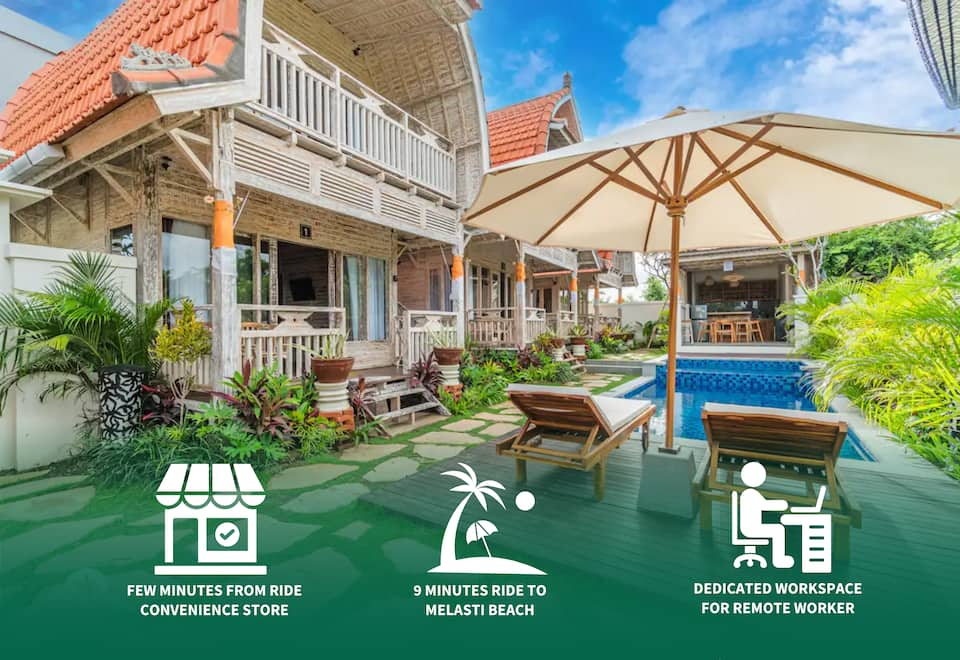Bali tourism is evolving in a rapid pace and on October 19, we had our change to invite several stakeholders from Bali’s property and tourism sectors convened to discuss the evolving landscape of Balinese tourism and the broader implications for Bali. Attendees included developers, local community representatives, and industry experts were all together at Bukit Vista’s Bali base where we delight them through a Round Table Talk dinner. This event also aimed to give partners and clients a deeper connection with Bukit Vista. Jing Cho Yang, CEO of Bukit Vista is currently demonstrating how Bukit Vista utilizes data to create decisions.


Enhancing Bali Tourism: Tourist Experiences with Local Cultural Elements

To enhance Bali tourism and improve tourist experiences with local cultural elements, providing opportunities for tourists to wear traditional Balinese attire can foster deeper interaction with the local culture. Additionally, offering workshops on local arts and crafts allows visitors to engage hands-on with the island’s rich artistic traditions, creating a more immersive experience. Organizing cultural tours that educate visitors about Bali’s history and traditions through visits to historical sites and participation in traditional ceremonies can further deepen their understanding and appreciation of the local culture, contributing positively to the Bali tourism experience.
These initiatives would not only enrich the Bali tourism experience but also help preserve and promote Bali’s unique cultural heritage. However, for these efforts to thrive, proactive steps must be taken to enforce existing regulations, incentivize the use of traditional materials and techniques, and foster greater collaboration between developers and local communities. By doing so, Bali can safeguard its cultural identity while continuing to attract visitors seeking authentic cultural experiences, setting the stage for the next important discussion on balancing economic growth and cultural preservation within the broader context of Bali tourism.
An example of this approach is evident in the traditional Balinese-style guesthouse, managed by Bukit Vista, showcased in the listing above. Nestled in the picturesque area of Ungasan, this property reflects the rich heritage of Balinese architecture, with its wooden structures and open-air design that invite guests to connect with the surrounding nature. Through properties like this, Bukit Vista demonstrates a commitment to promoting Bali’s cultural heritage while catering to the evolving needs of today’s travelers
Developing New Tourist Attractions in Bali Tourism Landscape


When discussing new tourist attractions in Bali, the focus often lies on preserving local culture as a primary draw for visitors. The integration of modern technology in promoting and managing these attractions can enhance the overall visitor experience, making it more engaging and accessible. Jing also highlighted how high-end Balinese costume rentals, similar to what is done in Kyoto and Tokyo, could be a unique addition to Bali’s tourist offerings. Setting up costume rental services near major temples like Uluwatu and Besakih, where tourists can rent traditional attire such as kebaya and udeng, would offer visitors a culturally immersive experience. This could be paired with guided temple tours and photography packages, allowing tourists to document their cultural experience while wearing traditional Balinese attire.

Integrating costume rentals with village events would let tourists participate in local ceremonies in authentic attire, deepening their connection with Bali’s rich traditions. This service not only enriches the Bali tourism experience but also supports local artisans and designers, generating funds for cultural preservation. The development of such attractions should also prioritize sustainability, encouraging collaboration between the government, entrepreneurs, and the local community to create eco-friendly, culturally respectful tourist destinations that will stand the test of time. Such collaborative efforts extend beyond attractions and into the broader Bali tourism industry, where cooperation is key to enhancing Bali’s global competitiveness.


The Importance of Collaboration Among Bali Tourism Industry Players

Collaboration within the tourism industry is essential for maximizing the potential of Bali as a world-class destination. Sharing knowledge and experience among industry players can improve the quality of services and products offered to visitors. This collective effort also strengthens the destination’s competitiveness by fostering joint marketing initiatives and promoting Bali in a unified and strategic manner.
Additionally, collaboration between the government and industry players can lead to better, more sustainable policies that benefit the long-term growth of tourism on the island. Proactive efforts to enforce existing regulations, encourage the use of traditional techniques, and support sustainable development through tourism will further ensure Bali’s continued success.
At Bukit Vista, we not only offer guidance but also foster a community where investors can exchange insights and strategies. Whether you’re looking for professional assistance or aiming to understand the Bali property market more deeply, we invite you to join our network of successful investors at the round table talk. Together, we can turn your investment into a sustainable, profitable venture that contributes positively to Bali’s future. Visit us at Bukit Vista to learn more about how we can achieve remarkable results together.
Take the First Step to Hassle-Free Property Management, Contact Us Today!
Partner with Bali’s leading property manager to elevate your property and enhance guest experience.


